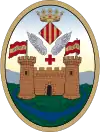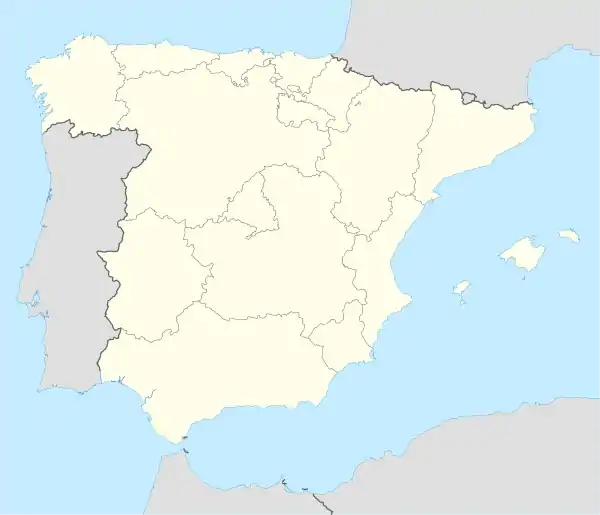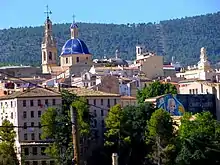Alcoy, Spain
Alcoy (Spanish: [alˈkoj]) or Alcoi (Valencian: [alˈkɔj]) is an industrial and university city, region and municipality located in the province of Alicante, Spain. The Serpis river crosses the municipal boundary of Alcoi. The local authority reported a population of 61,135 residents in 2018.[2][3] [4]
Alcoi/Alcoy | |
|---|---|
| Alcoi | |
 Panoramic view of Alcay, Alicante Province | |
 Flag  Coat of arms | |
 Alcoi/Alcoy Location in Spain | |
| Coordinates: 38°41′54″N 0°28′25″W | |
| Country | |
| Autonomous community | |
| Province | Alicante |
| Comarca | Alcoià |
| Judicial district | Alcoi |
| Government | |
| • Mayor | Antonio Francés Pérez (2011) (PSOE) |
| Area | |
| • Total | 129.86 km2 (50.14 sq mi) |
| Elevation | 562 m (1,844 ft) |
| Population (2018)[1] | |
| • Total | 58,977 |
| • Density | 450/km2 (1,200/sq mi) |
| Demonym(s) | Alcoià, alcoiana (Valencian) alcoyano, alcoyana (Spanish) |
| Time zone | UTC+1 (CET) |
| • Summer (DST) | UTC+2 (CEST) |
| Postal code | 03801-03804 and 03818 |
| Official language(s) | Valencian, Spanish |
| Website | Official website |
History
The first traces of human presence in the area date to c. 60,000 years ago, when Neanderthal hunters settled here, in a site now called El Salt.[5] A site with rock paintings, dating to c. 10,000/6,500 years ago, has been discovered near la Sarga. From around the mid-3rd millennium BC people started to move from the caves to the plain where cereals were grown, while mountain fortifications were erected (Mola Alta de Serelles, Mas del Corral, Mas de Menente, El Puig).
After the Roman conquest of the Iberians, several rural villas were built in the area, as well as a necropolis. The town was established in 1256 by James I of Aragon, with the construction of a castle on a strategic position over the Serpis river, to secure the southern frontier of the Kingdom of Valencia during the Reconquista.
In 1291 the town was donated by King James II of Aragon to the Sicilian admiral Roger of Lauria; it will not return a royal possession until 1430.
During the War of Spanish Succession, Alcoi sided for the cause of archduke Charles, and was therefore besieged and stripped of numerous privileges, which started a period of decline.
In 1873 the workers of Alcoy revolted in the Petroleum Revolution.
Main sights
Many outdoor rock paintings exist in Alcoi, and there are some ruins of an Iberian settlement with fragments of Greco-Roman pottery.

Buildings with an artistic or historical interest in the city include:
- Casa del Pavo (Turkey's house), Art Nouveau work of Vicente Pascual Pastor, (1909).
- Circulo Industrial de Alcoy, Art Nouveau work of Timoteo Briet Montaud, (1909-1911).
- Casa d'Escaló, Art Nouveau work of Vicente Pascual Pastor, (1906-1908).
- Casa Laporta, Art Nouveau work of Timoteo Briet Montaud, (1904).
- Casa Vilaplana, Art Nouveau work of Vicente Pascual Pastor, (1906).
- Casa Briet, Art Nouveau work of Timoteo Briet Montaud, (1910).
- Llonja de Sant Jordi, designed by the architect Santiago Calatrava. Made during the years 1992–1995.
- San Jorge Bridge, of art déco style, is considered to be the most popular image of the city.
- De Dins Square, a neoclassical square in the city center of Alcoy.
- Iglesia arciprestal de Santa María (Alcoy), in Valencian Baroque style.
- Hermitage of St. Anthony the Abbot (14th-18th centuries).
- Torre de Na Valora, a watchtower from the 13th century.
- Barchell Castle (13th century), of likely Muslim origin. It has a rectangular keep and a court with a rainwater tank.
- Alcoy Cemetery, considered to be one of the most interesting in the Valencian Community, due to its unusual architecture and examples of Valencian Art Nouveau period funerary sculpture. It is listed on the European Cemeteries Route.
- Convent of Sant Agustí, reconstructed in the 18th century with paintings of the 16th century.
Museums
- Museu Alcoià de la Festa, a museum dedicated to the Moors and Christians of Alcoy, where the visitors can experience all the details, aspects and feelings surrounding this international festival.
- Archaeological Museum Camil Visedo, established in 1945.
- Shelter of Cervantes, an air-raid bunker of the Spanish Civil War (1938).
- Firefighters Museum of Alcoy
Natural parks
Economy
Alcoy has important industries related to textile, paper, food and metal. Furthermore, Alcoy has many factories that manufacture matches. Today, Alcoy is the financial, commercial and cultural center of the surrounding area.
Celebrations
Alcoy hosts the oldest Cavalcade of Magi in the world. The Jesuset del Miracle is commemorated on the last day of January. The most important touristic celebration is Moros i Cristians, in April.
Sport
The local football club CD Alcoyano is famous across Spain for a proverbial match in which they were facing a very adverse score. When the referee was about to close, the Alcoyano players kept asking for more time to score back and reach a draw.[6] Thus the phrase tener más moral que el Alcoyano ("to have greater morale than Alcoyano") ponders an undefatigable person. Currently, they play in the Segunda División B at El Collao Stadium.
The city is also home to PAS Alcoy, a Spanish roller hockey club, which plays in the OK Liga, the first division of roller hockey in Spain.
See also
References
- Municipal Register of Spain 2018. National Statistics Institute.
- "Estadísticas de la población". Ajuntament d'Alcoi (in Spanish). Archived from the original on 7 October 2010. Retrieved 17 October 2010.
- "Estadísticas de la población - Por paises de procedencia". Ajuntamient d'Alcoi (in Spanish). Archived from the original on 24 July 2011. Retrieved 17 October 2010.
- "ESTADÍSTICAS DE LA POBLACIÓN - ALCOY - Población por edad y sexo". Ajuntamient d'Alcoi (in Spanish). Archived from the original (PDF) on 24 July 2011. Retrieved 14 October 2019.
- Los neandertales completaban con vegetales su dieta carnívora
- Notas de fútbol: Tienes más moral que el Alcoyano
External links
| Wikivoyage has a travel guide for Alcoy. |
| Wikimedia Commons has media related to Alcoy. |
- Alcoi Foto Pictures of Alcoi and Moros i Cristianos festivity in Alcoi.
- Christians & Moors Festival Images and a video.
- Alcoi Text, Images and Video.